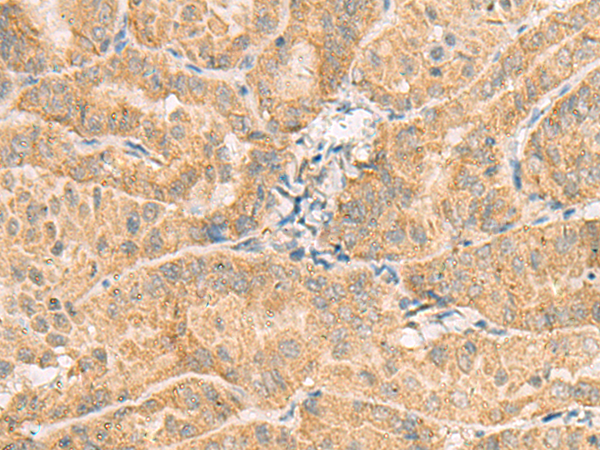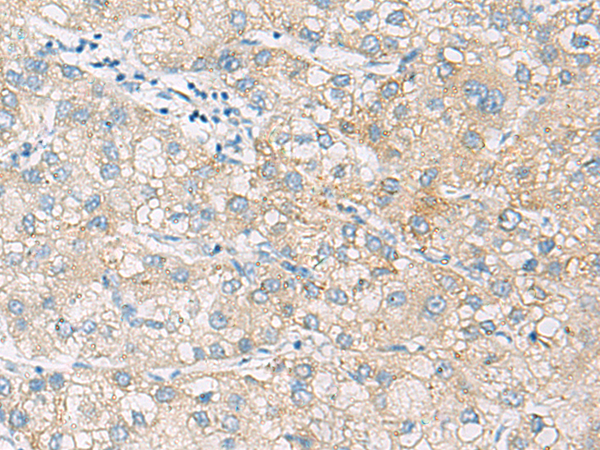

| WB | 咨询技术 | Human,Mouse,Rat |
| IF | 咨询技术 | Human,Mouse,Rat |
| IHC | 1/100-1/300 | Human,Mouse,Rat |
| ICC | 技术咨询 | Human,Mouse,Rat |
| FCM | 咨询技术 | Human,Mouse,Rat |
| Elisa | 1/5000-1/10000 | Human,Mouse,Rat |
| Aliases | RFG; ELE1; PTC3; ARA70 |
| Host/Isotype | Rabbit IgG |
| Antibody Type | Primary antibody |
| Storage | Store at 4°C short term. Aliquot and store at -20°C long term. Avoid freeze/thaw cycles. |
| Species Reactivity | Human |
| Immunogen | Fusion protein of human NCOA4 |
| Formulation | Purified antibody in PBS with 0.05% sodium azide and 50% glycerol. |
+ +
以下是关于NCOA4抗体的3篇代表性文献,按研究领域和抗体应用方向整理:
1. **文献名称**:NCOA4 mediates ferritinophagy and links iron metabolism to tumor suppression
**作者**:Mancias JD, et al.
**摘要**:该研究首次揭示NCOA4通过介导铁蛋白自噬(ferritinophagy)调节细胞内铁离子释放,并发现其表达缺失与癌症进展相关。实验中采用NCOA4抗体进行免疫印迹和免疫荧光,验证了NCOA4与铁蛋白复合物的相互作用。(*Molecular Cell*, 2014)
2. **文献名称**:NCOA4 Deficiency Impairs Systemic Iron Homeostasis
**作者**:Santana-Codina N, et al.
**摘要**:通过构建NCOA4敲除小鼠模型,研究发现NCOA4缺失导致肝脏和脾脏铁蓄积异常。使用NCOA4特异性抗体进行组织染色,证实其在肝细胞中的定位与铁代谢调控直接相关。(*Blood*, 2018)
3. **文献名称**:NCOA4 modulates HIF-1α stability in hypoxic cancer cells
**作者**:Gryzik M, et al.
**摘要**:该文献揭示缺氧条件下NCOA4通过调控HIF-1α蛋白稳定性影响肿瘤细胞存活,实验中利用NCOA4抗体进行免疫共沉淀(Co-IP),证明其与HIF-1α的物理结合。(*Cell Reports*, 2021)
**备注**:上述研究均涉及NCOA4抗体的关键应用场景(如Western blot、免疫组化、Co-IP),可作为方法学参考。如需特定应用场景(如IHC优化条件、抗体克隆号信息),建议补充说明具体需求。
NCOA4 (Nuclear Receptor Coactivator 4) is a multifunctional adaptor protein involved in critical cellular processes, including selective autophagy and iron metabolism. Initially identified as a coactivator for nuclear receptors like the androgen receptor, NCOA4 gained prominence for its role in ferritinophagy—a selective autophagy pathway that degrades ferritin, the iron-storage complex, to release bioavailable iron. This process is essential for maintaining cellular iron homeostasis, and dysregulation of NCOA4 has been linked to iron-related disorders, neurodegenerative diseases, and cancer.
NCOA4 antibodies are widely used in research to detect and quantify NCOA4 protein levels in various experimental models. These antibodies enable the study of NCOA4’s dual roles: in canonical autophagy, it binds cargo receptors, while in ferritinophagy, it interacts with ferritin and autophagosome machinery. Studies using NCOA4 antibodies have revealed tissue-specific expression patterns and its context-dependent functions. For instance, NCOA4 is upregulated in certain cancers, correlating with tumor progression and chemoresistance, while its loss is associated with anemia or neurodegeneration due to iron mishandling.
Researchers also utilize NCOA4 antibodies to explore its post-translational modifications, degradation pathways, and interactions with partners like SQSTM1/p62. These tools are critical for deciphering NCOA4’s role in diseases and its potential as a therapeutic target. Commercial NCOA4 antibodies are validated for techniques such as Western blotting, immunofluorescence, and immunohistochemistry, though variability in specificity requires careful validation for experimental reproducibility.
×